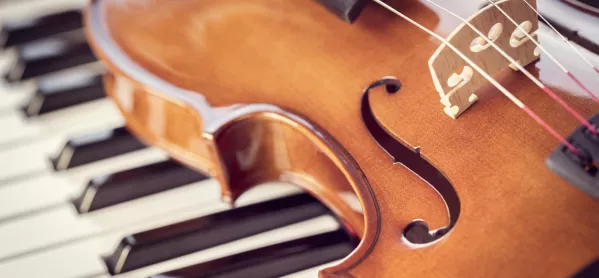Number of music pupils drops for third year in a row

The number of pupils in Scotland learning a musical instrument has dropped by almost 5,500 since 2016-17, with councils blaming “increased charges and a reduction in teaching capacity due to financial constraints” for the fall, according to the annual survey of councils’ instrumental music services.
Last year the number of pupils receiving council instrumental music tuition hit its lowest level since 2012-13, when the Improvement Service’s annual survey began.
In each of the first five years of the survey, there was year-on-year growth in the number of pupils studying an instrument. However, numbers peaked at 61,615 in 2016-17 and fell for the following three years, hitting 56,198 last year - the lowest level recorded.
Research: Covid’s impact on music teaching revealed by survey
News: ‘Delusional’ advice to learn new instrument attacked
Coronavirus: ‘Music will be pivotal in the recovery from Covid-19’
Opinion: The power of music to rebuild school communities
The report says: “Across all local authorities, 25 reported a reduction in pupil numbers between 2018-19 and 2019-20. Local authorities highlighted increased charges and a reduction in teaching capacity due to financial constraints as reasons for this. This reduction was by far the largest proportion of local authorities reporting a decrease in pupil numbers in any iteration of this survey. Unlike last year, however, no local authorities reported a decrease of more than a third in pupil numbers.”
Decline in instrumental music tuition in schools
The report adds that there had been large rises in fees in 2017-18, which, in part, accounted for the drop - but it says there had also been a drop in music instructor numbers, with full-time equivalent numbers down by over 40 in two years, which was impacting on councils’ capacity to deliver lessons.
The survey found that between 2012-13 and 2019-20, in non-charging authorities, there had been an increase of 31.4 per cent in pupil numbers, but in charging authorities there had been an overall decline of 12.7 per cent in pupil numbers.
This year (2020-21) the survey found that just five councils were providing instrumental music tuition completely free of charge.
Several more authorities had reduced or waived part of their fees this year due to Covid-19, the report says, and others had suspended fees, or had yet to confirm what they would be, it said.
The report also highlights that, due to school closures in 2019-20, many authorities had refunded fees.
For 2020-21, just four of Scotland’s 32 local authorities increased fees for group lessons, a comparatively lower percentage than in any previous iteration of the survey. All four of these local authorities increased fees by 3 per cent of the previous year’s tuition fee, ranging from £4 to £9 in cash terms over the academic year.
The authority where lessons are most expensive this year is Clackmannanshire, where the annual fee is £524 for group lessons - more than twice the average fee charged by councils of £236.46. The authority introduced the higher rate in 2018-19 and since then uptake has decreased by around 30 per cent, going from 432 pupils in 2017-18, the year before the higher rate was introduced, to 299 last year.
West Lothian Council only introduced charging in 2018-19 but is the second most expensive authority, with fees of £354 per year. There, pupil numbers have almost halved going from 2,178 in 2017-18, the year before fees were introduced, to 1,131 last year.
However, the report says all 25 local authorities that charged for instrumental music lessons in 2019-20 also offered some form of concession for families with low incomes and students sitting Scottish Qualifications Authority (SQA) qualifications.
In total in 2019-20, for the 31 local authorities where data was provided, the gross cost of providing instrumental music services was £30,061,758, according to the report.
Instrumental music is a discretionary service provided by all local authorities in Scotland and is separate to the music curriculum taught within the classroom.
You need a Tes subscription to read this article
Subscribe now to read this article and get other subscriber-only content:
- Unlimited access to all Tes magazine content
- Exclusive subscriber-only stories
- Award-winning email newsletters
Already a subscriber? Log in
You need a subscription to read this article
Subscribe now to read this article and get other subscriber-only content, including:
- Unlimited access to all Tes magazine content
- Exclusive subscriber-only stories
- Award-winning email newsletters